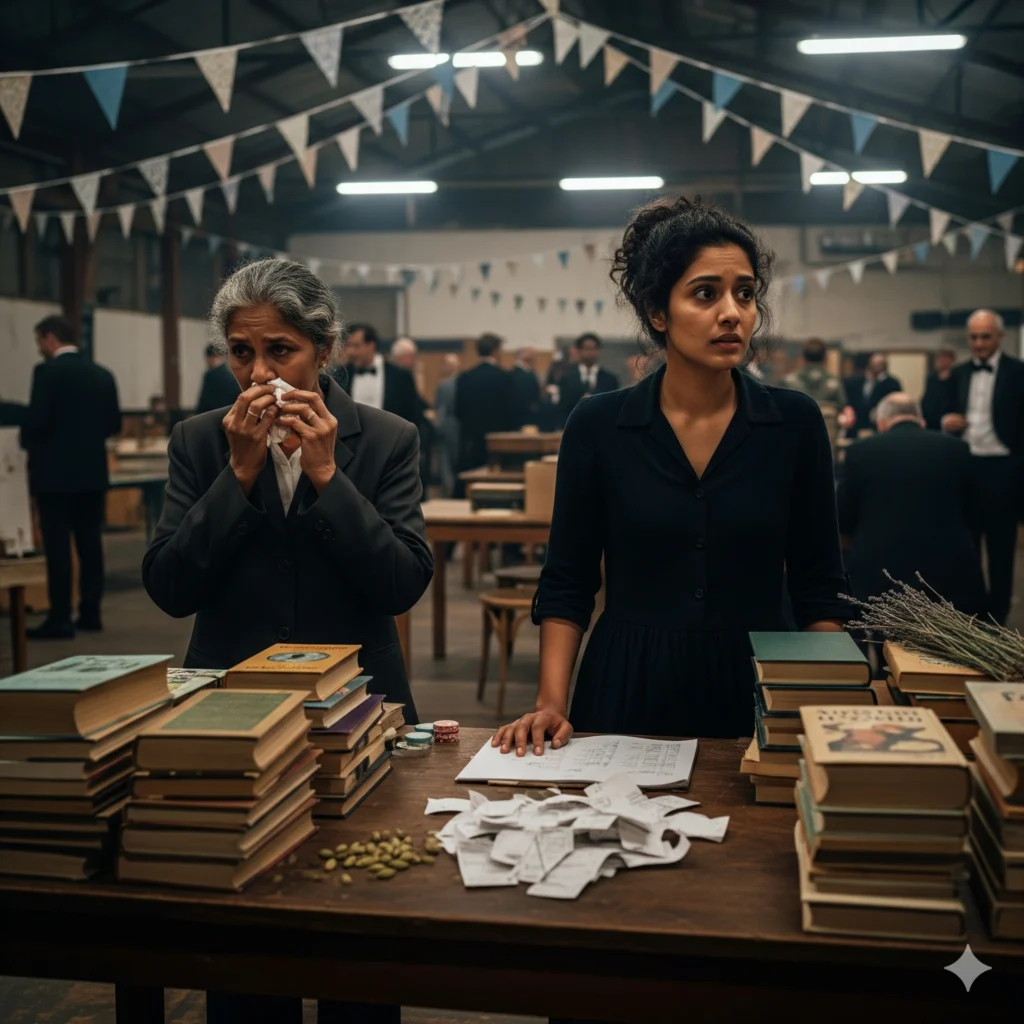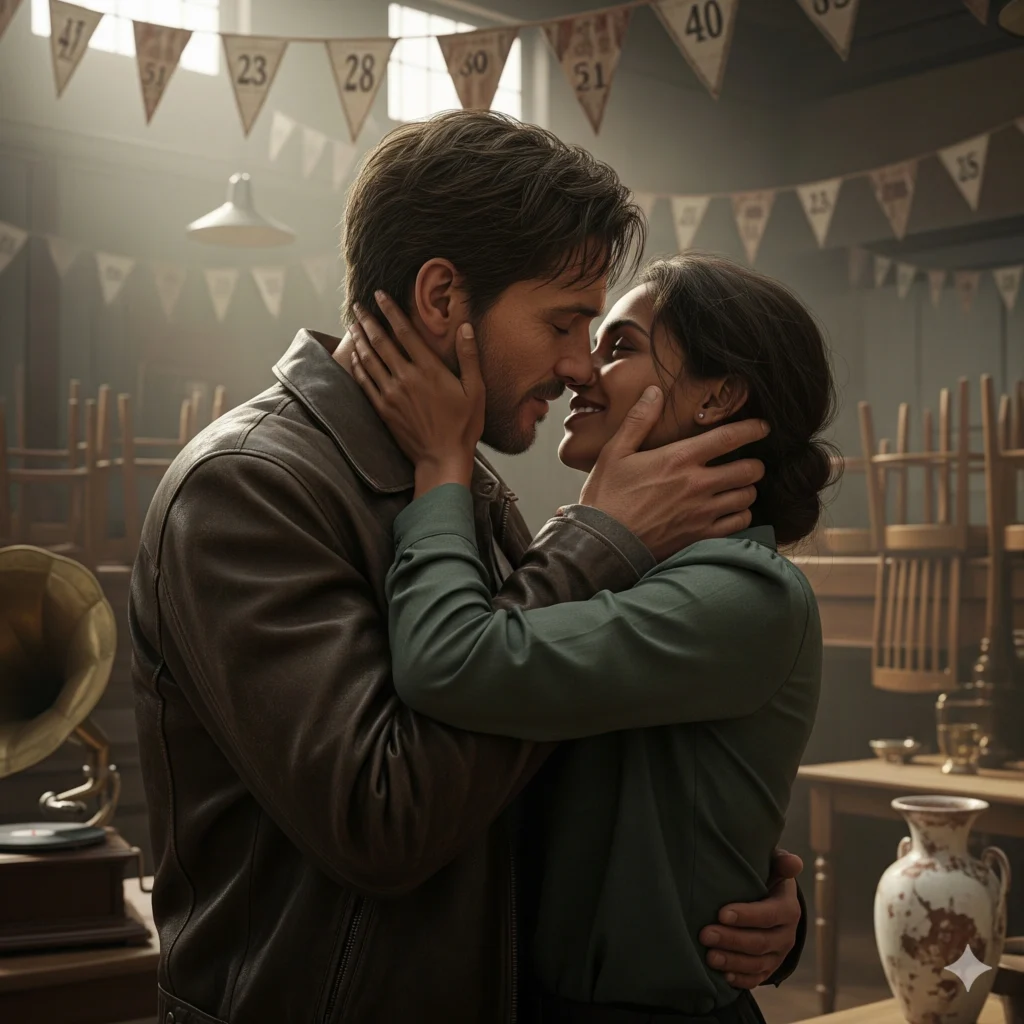“You could still smell the sea in the auction hall. The copper tang of rust and the cleaned lemon of someone trying too hard to look respectable.”
When the town decided to save itself, they did it with bunting, borrowed tuxes, and a lot of polite cruelty. The fundraiser was supposed to be quaint: bake sales, a raffle, a silent auction. Then someone. Some combination of desperation and bad ideas suggested a live auction of “guardians,” people willing to be paired with winners for a year in exchange for protection and resources. It became a spectacle, and a single column in the developer’s ledger.
Mira Jayasinghe stood behind a table of paperbacks and a stack of receipts that smelled faintly of cardamom and lavender. Her mother, Anushka, was sniffing into a tissue like a person measuring wind direction.
“You don’t have to…” Anushka began.
Mira waved her hand. “If I don’t, the bank sells the shelves. If the shelves go, so do thirty-two first editions of everything I didn’t know I needed.” She flipped a paperback over and smiled at her reflection in the plastic covering. “Besides, it’ll be a story.”
“Stories don’t pay municipal liens,” Deputy Rian said, leaning in. He had the too-wholesome face of someone who still believed town meetings could fix a lot of things. “It’s… unorthodox, Mira.”
“Unorthodox is what we can afford.” Mira folded her hands.
“And I’d rather auction myself than sell the shop to a man who thinks coffee tables are ‘the future of living’.”
“You’re joking,” he said.
Mira wasn’t. “I’m not.”

The auction hall smelled like lemon oil and regret. People in velvet clapped politely; teenagers filmed the whole charade on their phones. A banner declared, in heroic font, SAVE HARBOR ROW.
Mira walked onstage as though it were a normal Saturday. She felt absurd. She had practiced her speech three times in front of the shop’s window and had decided, finally, to be honest.
“Good evening,” she said into the microphone, voice steady. “I’m Mira. I own the Harbor Shelf. I have a dog-eared copy of ‘The Tempest’ that I’d be happy to trade for a decent lock on the shop door. I’m also, apparently, extremely auctionable.”
Laughter. The room warmed.
A man in a navy suit raised his paddle. He whispered to someone beside him, then seemed to change his mind.
He raised it again.
More paddles went up. One by one, people bid for houses, dinners, and odd bundles. Then Kael Harrow’s paddle went up.
Kael was a rumor with a jawline. Years ago he had left town to be a marine. Later he’d returned, quiet as a tide, money stitched into the edges of his life. He owned the shipyard and three old boats that smelled of diesel and kindness. People said he could buy a ruin and turn it into a fortress. Some said he already had.
Mira watched him from the stage. He kept his face like a closed book.
“Going once,” the auctioneer announced. “Going twice—”
“Fifteen hundred.” Kael’s voice was low enough that Mira felt it in her ribcage. It wasn’t a purchase. It was a removal of weight.
Gasps. Anushka’s hand was a sudden cold thing around Mira’s wrist.
“You don’t—” she hissed.
Mira lowered her chin. “Kael?” she called, because that’s what people did when a myth sat in the audience and decided to be present. “You planning to redecorate my shop?”
Kael’s lips twitched, which might have been a smile. “I plan to keep my word.”
“You have a word I don’t know about?”
“Not yet,” he said. He took the podium microphone like a man checking anchor lines. “My aunt’s roof leaks. She taught me that a promise is a roof. If you need a roof, I’ll bid.”
“Then bid like a normal person.” Mira folded her arms. “Two thousand?”
She heard herself bargaining in public and felt the absurdity like a second skin. The room loved it. People cheered for the drama, unaware they were cheering for a transaction that felt, to Mira, a little like selling an umbrella in a storm.
Kael won.
The contract was blunt: a year of partnership, protection, and agreed responsibilities. The winner didn’t own the “bride”. The “bride” could leave at any time. It was designed, Deputy Rian had assured them, to be safe. It felt like a compromise between theater and law. Still, Mira signed, more of a pen stroke than a surrender.
At Kael’s house, barnlike and full of waves through its beams, he showed her the guest room. It wasn’t gilded. It had a ladder shelf and a small window that looked toward the shipyard where gulls circled like punctuation marks.
“If you want me to get rid of the banner,” Kael said, “I’ll have someone take it down tonight.”
“You could also help me put it back up if it rains,” Mira said. “We can negotiate.”
He looked at her long enough that she realized he wanted terms, not performance. He was the sort of man who read instruction manuals like letters from a friend. Slow, careful, respectful of paper.
“I propose equal terms,” he said finally. “Neither of us owns the other. We protect each other’s things. We don’t interfere with the shop unless asked.”
“And the shipyard?” Mira asked.
“You can use the kettle upstairs. It’s terrible, but it makes tea.”
Mira nearly laughed. “Deal. But you have to help me move the boxes from the attic on Tuesday. Nobody climbs attics like I do.”
“Especially not people who own a bookshop,” Kael said.
Their early days were a series of small collisions. Him trying to “protect” by bolting new locks she refused, her refilling his coffee with too much sugar and watching his face for the betrayal of taste.
They rowed and reconciled with words that felt sincere. He read surveillance contracts for fun; she taught him the exact way to mend a torn jacket seam so the repair became a little secret between hands.
“You eat too quickly,” Mira teased once as they sat on the stoop after a night of hauling boxes.
“You talk too loudly in auctions,” he shot back.
“You mean you don’t appreciate my dramatic timing?”
He laughed then, a short, honest sound. “I appreciate many things about you I don’t deserve.”
“You don’t have to deserve appreciation,” she said. “You just have to choose to give it.”
That choice took on weight after they discovered the developer’s plan.
Mira found it while sorting through donation jars. A stack of letters priced like favors. A neat, inked pattern showed who had been promised improvements, who had been paid off. The developer, Gideon Velasquez, had been buying the block, quietly and through legwork that smelled of small envelopes and smoother hands.
“You can’t possibly be serious.” Deputy Rian’s face had gone to a color too close to the sea.
“I am,” Mira said. She put the letters down in front of Kael. “He’s been stacking votes. He financed the renovations for the hall, the banner, everything. This auction is smoke and mirrors.”
Kael read the handwriting. His jaw set. “We don’t let people sell our town to the highest bidder.”
“You think we can stop him?” Mira asked. “He’s polished. He has a board. He brings people brochures that smell like clean marble.”
“We have honest receipts and witnesses,” Kael said. “And we have a woman who sells the best used copies of ‘The Tempest’ on the coast.”
Mira nearly dropped the stack. “Flattery and civic pride… good combo.”
They rallied the town. At a packed meeting, Gideon unfolded computer slides while Mira read aloud letters and receipts that smelled like her shop: old glue and resolved intent. People shifted in their seats, like seabirds finding wind.
“You sold yourself at an auction,” Gideon sneered, trying to spin the spectacle into triviality. “Isn’t that charming? The town saved by pageantry.”
Mira put her hand on the microphone and looked at him like she looked through old mysteries. “My books are not pageantry, and neither is the choice to stand against you.” She read the receipts, the signatures, the small handwriting of neighbors who would rather have a library than a condo.
Kael did not stride onto the podium and declare war. He stood beside Mira, hands folded, eyes steady. When Gideon tried to bully, Kael produced facts like labor records from the shipyard, timelines, a ledger that showed Gideon’s shell purchases. It was not brutality; it was documentation. The community rallied. People who had been polite to Gideon’s suits found their voices.
“We bought this town with sweat,” Anushka said from the back, voice hoarse. “Not with a man’s brochure.”
The meeting ended with the town voting to place a moratorium on development. Gideon stormed away with his brochures and his polished shoes.
After the fight, nothing changed overnight. But the shop stayed. The roof still leaked sometimes; they learned to dance around it. Kael’s protection didn’t look like possession; it looked like showing up with a bucket during a storm and patching a flat tire at dawn.
One evening, as the sun turned the shipyard’s beams into orange bones, Mira and Kael sat on the roof of the shipyard, sharing a thermos of tea.
“You ever think about leaving?” Mira asked, watching a boat cut a pale line across the water.
“Sometimes.” Kael shrugged. “But the sea brings things back that belong here.”
“You ever think about staying because someone needs you?” she asked.
“I think about staying because someone makes staying feel possible,” he said. “Because someone argues for the right way to fold a fitted sheet.”
She snorted. “That would be me. I will not have a poorly folded fitted sheet in this house.”
“You signaled me,” he said. “You could leave the contract. You still didn’t.”
“You could have forced me,” she said, softer.
He shook his head. “And lose trust? No. I’d rather earn it.”

They turned toward each other, neither grand nor coy. The kiss that followed was careful and messy and theirs. Two people who had learned that consent is an ongoing conversation, and trust is something you build between small actions. Returning a library ladder to its place, not telling an embarrassing anecdote in public, standing firm during a town meeting.
“We could write our own contract,” Mira murmured when they broke apart.
“We already have,” Kael said. “It’s called choosing.”
The year passed and the contract lapsed like all things that are meant to be temporary. People stopped calling Mira “the auctioned bride” the way the sea stopped insisting on foam. She and Kael developed rituals that no ledger could dictate: Sunday tea, shared chores, the way they saved receipts in the same tin.
“You didn’t buy me,” Mira said one night as they stacked dishes. She watched him, seeing everything and none of the town rumors. “You asked me to stay.”
“And you chose to,” he replied.
Outside, the harbor lights blinked like punctuation. Inside, their hands found each other in the small dark between the sink and the window.
“He didn’t keep me,” Mira said later, leaning against the threshold to the shop. “He kept a promise.”
“He kept a roof,” Anushka corrected, smiling.
Mira looked at Kael. He smiled back. A small thing, a brightness in a lined face. “And we turned the leak into a song,” she said.
They both laughed, not at the line but with it. The town had tried on a spectacle and then, improbably, learned the thrift of real love: that it doesn’t trade ownership for safety; it trades fear for care, theater for the stubborn everyday.
Outside Harbor Shelf, the banner they’d used for the auction hung again. Patched. Someone had turned it into a kite on a windy day.
Mira watched it lift, felt it tug in the same direction as her heart, and felt, in the firm quiet of an ordinary night, that choice was the kindest currency of all.